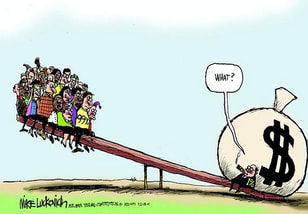2.8 Equity in the distribution of income

By the end of this unit you should be able to:
- Explain the difference between equity in the distribution of income and equality in the distribution of income.
- Explain that due to unequal ownership of factors of production, the market system may not result in an equitable distribution of income.
- Analyse data on relative income shares of given percentages of the population, including deciles and quintiles.
- Draw a Lorenz curve and explain its significance.
- Explain how the Gini coefficient is derived and interpreted.
- Distinguish between absolute poverty and relative poverty.
- Explain possible causes of poverty, including low incomes, unemployment and lack of human capital.
- Explain possible consequences of poverty, including low living standards, and lack of access to health care and education.
- Distinguish between direct and indirect taxes, providing examples of each, and explain that direct taxes may be used as a mechanism to redistribute income.
- Distinguish between progressive, regressive and proportional taxation, providing examples of each.
- Explain that governments undertake expenditures to provide directly, or to subsidize, a variety of socially desirable goods and services (including health care services, education, and infrastructure that includes sanitation and clean water supplies), thereby making them available to those on low incomes.
- Explain the term transfer payments, and provide examples, including old age pensions, unemployment benefits and child allowances.
- Evaluate government policies to promote equity (taxation, government expenditure and transfer payments) in terms of their potential positive or negative effects on efficiency in the allocation of resources.
Crash Course Inequality |
The Lorenz Curve |
|
|
|
Evaluating Policies to Tackle Inequality
There are many tools at a governments disposal to tackle inequality. Unfortunately all of them come with opportunity costs and potential unintended negative outcomes which could potentially exacerbate the problems of inequality.
